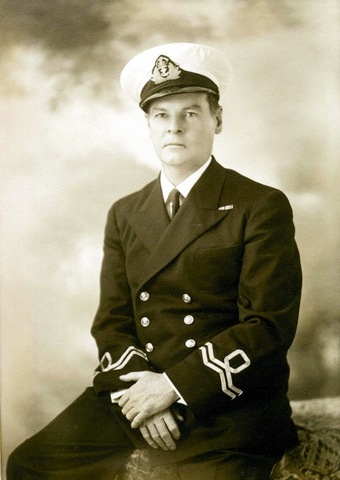John Stanley Parker was born on January 15, 1890 in Boston, Massachusetts. He was Harvard graduate, successful businessman, and a volunteer for the British Navy in June of 1941. He served on HMS Broadwater (destroyer) which was torpedoed and sunk on October 18, 1941 by U-101 boat. His body was never found. His name is commemorated on a panel in the Plymouth Naval Memorial, UK.
From Americans at War in Foreign Forces:
Among the 22 Americans who initially joined the Royal Navy through the Royal Naval Volunteer Reserve, A.H. Cherry was preceded by John Stanley Parker. In 1940, Parker was, like others who would precede their countrymen to war, alarmed at the potential he saw for Hitler’s designs on Europe. He was also a restless man who had grown up in the best schools, gone to Harvard, and enjoyed the country and yacht clubs of Boston and Bedford, though his family was not of exceeding wealth. He had served in the U.S. Navy in the previous war, but he was now 50 years old. The stock market crash of 1929 had set back his own business ambitions, and reduced him to a job he hated as a “customers man” in a Boston brokerage house. An attempt to rejoin the Navy at the Charleston Navy Yard was rebuffed, and Parker continued on north. His son Frank had preceded him into Commonwealth service by joining the Canadian Black Watch in October 1940, but the elder Parker was turned away from that group. Then he heard that the Royal Navy was in search of experienced yachtsmen to serve as naval officers. Back in Boston, he was referred to the British Consul in Washington. There, he was met with bureaucratic indifference and traveled to Halifax to meet with Vice Admiral Bonham-Carter. In another indication of the confusion between different sources with different agendas about the legality of such enlistments, Parker carried with him a personal letter from Under Secretary of State Sumner Welles, which said that Americans would not lose their citizenship in such cases as long as they enlisted outside of American borders, but were liable to be punished if they then went into a war zone. Parker’s efforts remained frustrated. What followed was a months’ long dance between himself and various British consular officers in America who seemed only to respond to Parker and similar others in patronizing ways; a sense in Whitehall, London that it would be desirable to have such Americans in the fold; and the real-world need by Bonham Carter for good men, nationality and age, evidently, be damned. The Vice Admiral won the day and, on June 7, 1941, Parker was commissioned as a (Temporary) Lieutenant in the RNVR. It seemed not to be noticed that this by now very well known man gave his age as forty years. With two confederates, he was one of the first three World War II Americans to enter the Royal Naval College at Greenwich, London.
From: http://uboat.net/allies/merchants/crews/person/567.html
During the night of 17/18 Oct 1941, U-101 tried for three hours to overtake convoy SC-48 south of Iceland and after several approaches were frustrated by the escorts fired a spread of four torpedoes at HMS Broadwater (H 81) (Cdr W.M.L. Astwood, RN (rtd)) astern of the convoy at 04.20 hours. After 2 minutes 30 seconds, the destroyer was hit by a torpedo on the starboard side forward of the bridge and lost its complete bow. The three A/S trawlers of EG 3 were sent to her assistance with HMS Angle (FY 201) (T/Lt E. Playne, RNVR) going alongside to rescue the survivors and HMS Cape Warwick (FY 167) (T/Lt W.E. Goggin, RNR) and HMS St. Apollo (T/Lt R.H. Marchington, RNVR) screening the area but they did not notice U-77 (Schonder) which investigated the scene. At 06.33 hours, the U-boat even unsuccessfully fired a torpedo at one of the shadows and then left the area after recognizing the vessels as small escorts.

PRIVATE CITIZENS SUPPORTING AMERICA'S HERITAGE
American
War Memorials Overseas, Inc.
War Memorials Overseas, Inc.
Parker John Stanley
Name:
John Stanley Parker
Rank:
Serial Number:
Unit:
Royal Navy Volunteer Reserve
Date of Death:
1941-10-18
State:
Cemetery:
Plymouth Naval Memorial, United Kingdom
Plot:
Panel 61, Column 2
Row:
Grave:
Decoration:
Comments:
